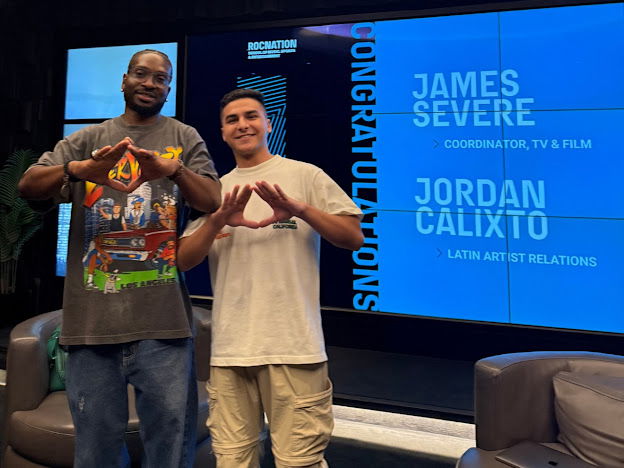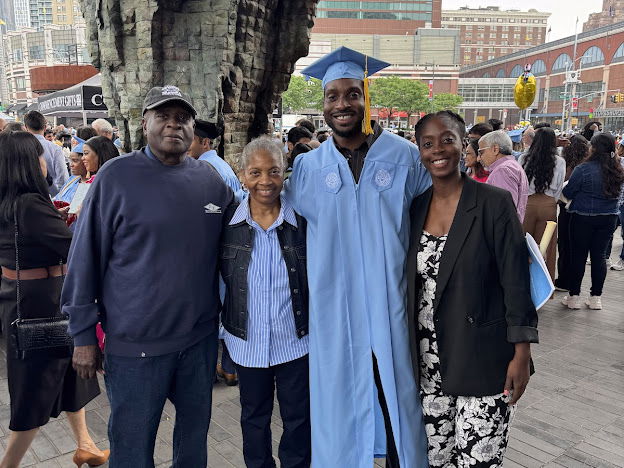When James Severe arrived at West Virginia University in 2012, he had one thing on his mind: football. “I went to a pretty popular prep school in North Jersey—Don Bosco Prep—big football school,” he recalls. “But you hit a point where you get realistic. Like, I’m not LeBron. I’m not going to the league. So, I figured, maybe I’d be an agent. Still stay close to the game.”
That dream derailed when he was 19 and got caught with a pound of weed. No guns. No cash. Just marijuana in a state that only recently legalized recreational use.
“I was a sophomore in college,” he says. “And in West Virginia, that was enough to get me two years.”
James takes full responsibility for the mistake that led to his first incarceration. “I put myself in that position. I own that,” he says. “Should I have been in prison for that long? No. You know, did it matter that I was from New York? I was Black? Probably. Most likely.”

After serving his time, James came home determined to rebuild. He enrolled at Nassau Community College, made the dean’s list, and even made the junior college’s football squad. While it was clear the league wasn’t in the cards, he had a plan in place to pursue a career in sports business. He landed his dream internship at a sports agency in New Jersey and picked up an overnight job at Morton Williams supermarket and a barback gig in Times Square.
By late 2019, he transferred to the City College of New York to study psychology, balancing classes, two jobs, and an internship. “I was rolling,” he says. “Keeping up with everything. Just doing my thing… I was set to graduate in spring.”
That momentum came to a screeching halt in December, three days before his birthday. Pulled over for speeding on his way to work, James was blindsided when officers told him there was a fugitive warrant out for his arrest. The reason? A clerical error.
“My parole officer had retired during COVID,” he explains. “We were doing phone check-ins, and I was still calling, answering the prompts, changing my address when I needed to. I had no idea no one was monitoring it.”
No one contacted him to follow up. No warning. Just jail.
“I’m on parole. I’m basically the best candidate to be on parole, you know, honestly. You couldn’t really paint a better picture with what I was doing and like what I was achieving while on parole. I was kind of like in shock. I felt like—like my life just—just dropped.”
Because no one was tracking his check-ins, James was accused of absconding. “They treated me like I’d disappeared,” he says. “But I was a full-time student, working two jobs, interning. I wasn’t hiding. I was right there.”
Even after learning that his officer had quietly retired, and a new officer had only just discovered the case, there was no correction. No reversal. No apology. When James appeared before the parole board, New York parole didn’t even show up.
He ended up spending over five months incarcerated, first at Rikers Island, then in West Virginia. “I sat in Rikers for about over a month… I wasn’t housed for like the first, like, two, three days when I got there. Like, sleeping on the floor… I don’t know how I coped, as I’m talking about it right now. I really don’t. I kind of, like, lost myself.”
“I was found guilty based on a sheet of paper,” he says. “Nobody ever took responsibility. One day, I just got an email that said, ‘You’re off parole.’ That was it.”
Released with no fanfare and no restitution, James had to start over from scratch. “It felt like I had to rebuild my entire life—again,” he says. “But I wasn’t going to let it break me.”

His sister, Tracy, connected him to a nonprofit digital media program for formerly incarcerated people. He completed the training, picked up new skills, and heard about the Roc Nation School. “That was my last shot,” he says. “I was 32, going back to school, and barely had enough money to finish. But I said, either I’m gonna work in this business or I’m not.”
James enrolled in the Sports Management program and kept pushing. He interned at Roc Nation’s TV & Film division, where he eventually landed a full-time role. Today, he’s a producer on the Joe and Jada podcast hosted by Fat Joe and Jadakiss.
“To sit in a room with them every week and have my voice respected?” he says. “They respect me even more once they find out what I’ve been through. That means something.”
While he was enrolled at the Roc Nation School, he had a chance encounter that brought everything full circle. “Michael Rubin was one of the first guests who came to the school,” James says. “And I was able to share my story, say thank you to them and, you know, everything. And now we hand in hand at Roc Nation. It’s cool.”
That moment marked the beginning of his relationship with Reform Alliance, the criminal justice advocacy organization founded by Rubin, Jay-Z, and Meek Mill.
“They gave me a voice,” he says. “I was able to accept my past and try to progress from it.”
Now, James is part of a growing network of changemakers, using lived experience to fight for smarter policies and second chances. And he’s not afraid to share what he’s been through because he knows it might help someone else find their way forward.
In addition to Roc Nation, Reform Alliance, and the nonprofit storytelling platform The Moth, where he also interned, Severe credits his boss, Lori York, with helping him stay the course. “She stuck her neck out for me,” he says. “She treats me like family.”
This past spring, James walked across the stage at the Roc Nation School and accepted his degree. His son, Jade, turns two this fall.
“To be able to do all this and make him proud? That’s what matters,” he says. “I did it the long way. But I did it the right way. I really worked for this.”
Not everyone gets a second chance. Even fewer get another after that.
James Severe did—and he earned it. He’s building a future not just for himself, but for his son, as well. With every move, he’s proving he’s not just back on track, he’s exactly where he belongs.
RELATED CONTENT: BMX To XCEL Summit For Men: A History Of BLACK ENTERPRISE’s Coveted Men’s Event


